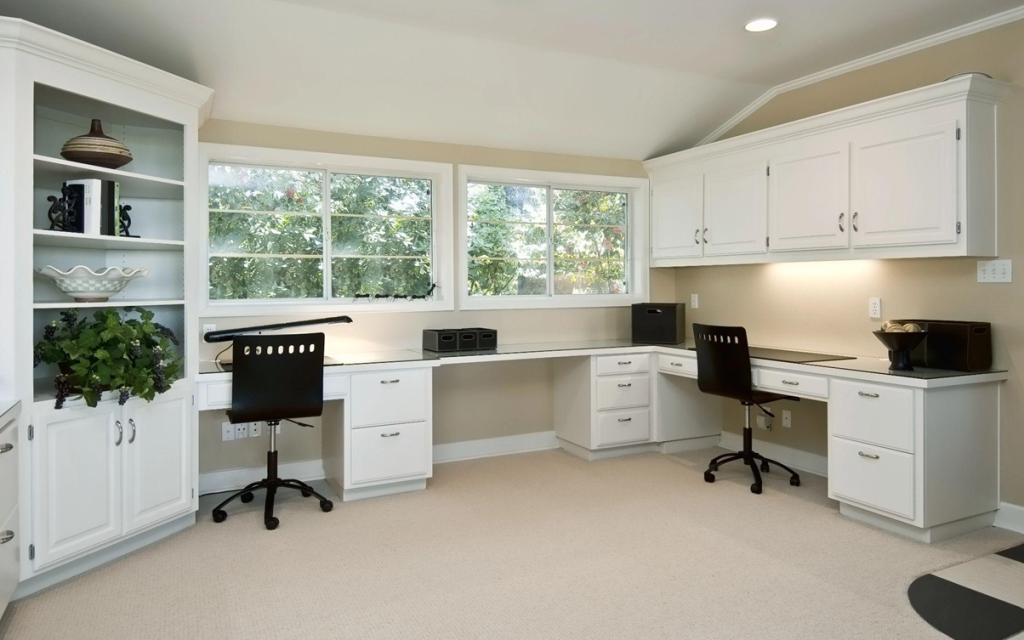A home office is no longer merely a luxury; it’s becoming a necessity for many of us. With the exponential growth in remote working and freelancing scenarios over the recent years, creating a reliable home office that enhances productivity has come into focus.
Having an organised, comfortable workspace at home can bring immense benefits, both professional and personal. It can boost productivity, foster creativity, and make you feel more composed and in control. Furthermore, an optimised home office layout can ensure a seamless blend of comfort and functionality, enabling you to work more resourcefully.
This article aims to guide you in setting up your very own efficacious home office. It will provide insights into the basics of a home office, the importance of ergonomic furniture, the psychological impact of office decor on productivity, and the significance of reliable technology and tools. Additionally, it will detail the importance of regularly maintaining your home office for sustained productivity.
Understanding the Basics of a Home Office
A home office is a dedicated space within your residence that is designed and organised for work-related tasks. This space should be free from external disturbances and should promote focus and productivity.
The size of a home office will largely depend on the nature of your tasks. Simply put, the designated space should be sufficient for you to operate comfortably without feeling confined or cluttered.
The location of the home office is just as important. Whether it’s a separate room, a small nook in a corner, or an area with a beautiful view, it needs to work for you. This workspace sanctuary should not only provide practicality in terms of lighting and stability but also inspire creativity.
Essential Home Office Furniture for Productivity
Furniture in a home office plays more than just a functional role. Ergonomically designed furniture, apart from preventing work-related injuries, can significantly boost productivity and comfort levels.
You should have a sturdy work desk, which is large enough for your desktop or laptop, along with other essentials like a lamp or a stationery holder. A comfortable chair that supports good posture will also benefit your working hours by reducing strain and discomfort.
Ample storage units are necessary to keep your workspace clutter-free. Choose shelves, cabinets, or drawers based on your needs and the nature of your work, to smartly tuck away files, magazines, stationery, and other work materials.
Importance of Office Decor that Energises and Motivates
Office decor can have a considerable psychological impact on your productivity. While an excessively decorated space can serve as a source of distraction, an overly bare space might fail to inspire.
Selecting the right colours, artwork, plants and lightning conditions could significantly influence energy levels. Light hues, for example, can make the space appear larger and more relaxing.
Striking a balance between personalised and professional decor is key. Objects of personal interest that offer inspiration can be placed, just as long as they do not divert attention away from work.
Technology and Tools that Boost Efficiency
Reliable technology and a robust high-speed internet connection form the bedrock of a productive home office. Selecting the right computer system, printer, and other equipment will make a difference in your work efficiency.
Organising cables, wires, and plugs can reduce the time spent troubleshooting and visually declutter your workspace. Find out if you could benefit from data cabling in your home office. Data cabling creates a permanent network infrastructure, eliminating the need for messy wires and ensuring a reliable, high-speed internet connection. Where possible, data cabling could be a smart approach to streamlining and concealing messy wires.
Organising and Maintaining Your Home Office for Sustained Productivity
Creating a productive home office isn’t a one-time task. Regular maintenance and organisation are necessary for long-lasting productivity.
Decluttering, whether it’s starting the day with a clear desk or filing away documents in the correct place weekly, reduces time wasted searching for things.
Creating a daily routine that includes tasks specific to maintaining your workspace can also be beneficial. This can involve everything from cleaning your desk, putting away equipment after use or updating your to-do list. It is also crucial to keep personal and professional life separate while working from home.
Conclusion
The positive impact of a well-set home office on productivity and work-life balance is undeniably rewarding. Crafting such a workspace requires understanding and careful selection of the right furniture, decor and technology.
Implementing the strategies and tips suggested in this article can help you create a supportive, productive workspace at home that not only enhances your work efficiency but also supports your holistic well-being. Start with these insights and tweak your workspace until you find the perfect harmony between comfort, functionality and productivity.
You may also like
-
Hiring An Architect To Design Your Home
-
Winter is Coming: A Kansas Building Manager’s Guide to Preventing Frozen Pipes with Commercial Plumbing Services in Kansas
-
How to Install an Artificial Hedge Easily
-
Get Exclusive Diwali Offers on Whirlpool Double Door Refrigerators
-
Who is Best Pipe and Joint System Supplier in Malaysia

